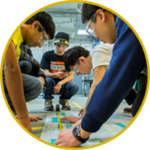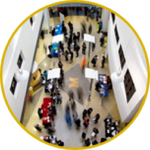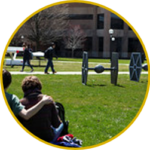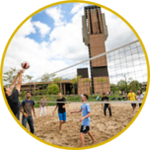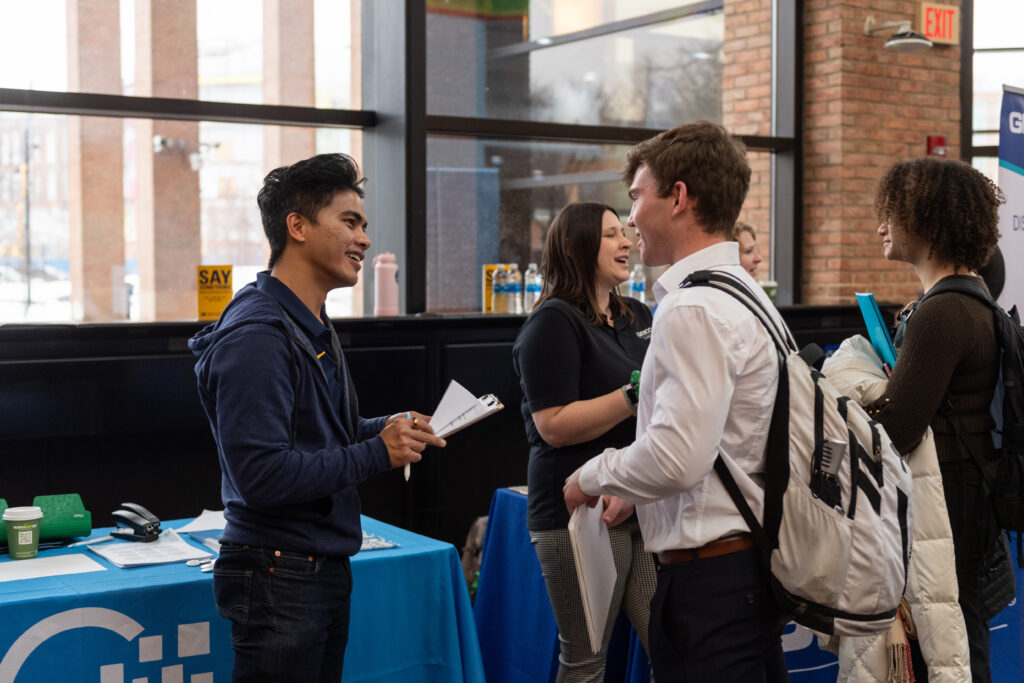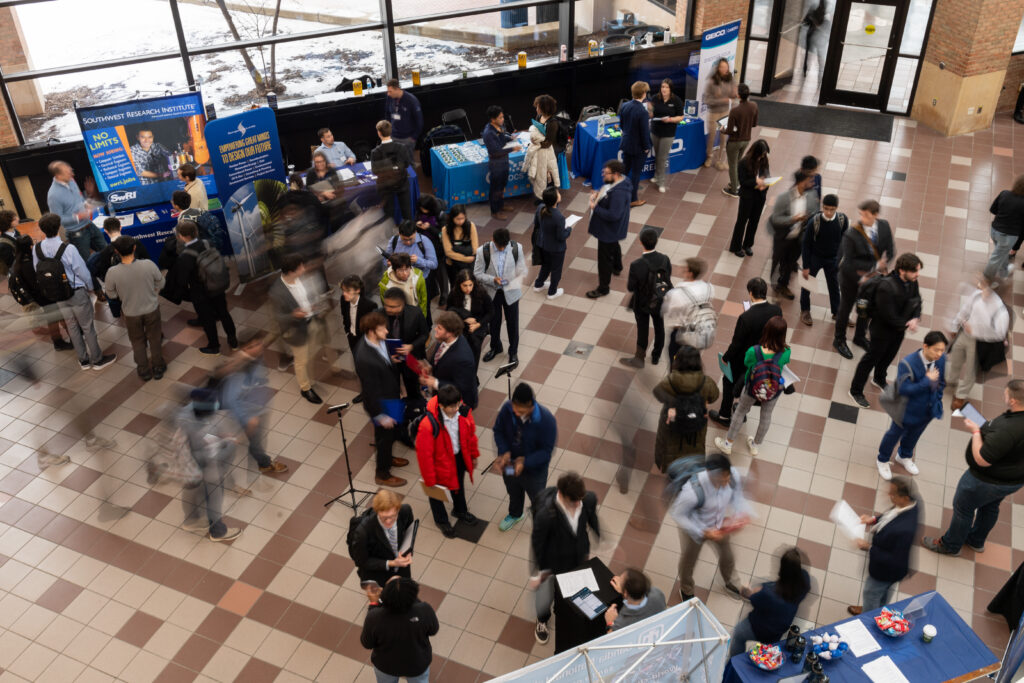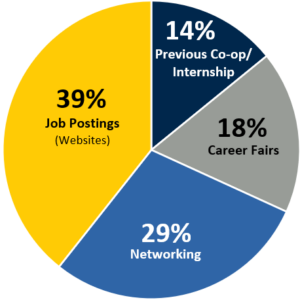Whether you are searching for Full-Time Employment after graduation, an Internship (Summer Internships provide students with an opportunity to learn about the engineering profession from observation and participation during the spring/summer semester) or Co-op Employment the ECRC is here to help you! The below strategies and resources will help you through the job search process.
JOB SEARCH TIMELINE
As a Michigan Engineering student, take advantage and start your search early! For many employers, internship and full-time recruiting kicks-off and is at its peak in the Fall, however recruiting continues for the entire academic year. Following is a general recruiting timeline for the fall and winter semesters:
Fall Semester
Early September
- Recruiting activity begins
- Schedule an ECRC career advising appointment to get ready for recruitment season
- Apply for positions posted in Engineering Career
September
- Peak volume for campus recruiting activity
- Attend fall engineering career fairs and other networking events
- Continue to apply for positions
- Schedule interviews
October
- High volume campus recruiting continues
- Attend career fairs and other networking events, including information sessions, tech talks, coffee chats, etc.
- Continue to apply for positions
- Schedule interviews
Winter Semester
January
- High volume of campus recruiting activity
- Schedule and ECRC career advising appointment
- Attend Winter Engineering Career Fair
- Apply for positions posted in Engineering Careers
February
- High volume of campus recruiting activity
- Attend employer events such as information sessions, tech talks, coffee chats, etc…
- Attend Company Days
- Continue to apply for jobs
- Schedule Interviews
March
- Recruiting slows down
- Campus recruiting continues for “just in time hiring”
- Meet with an ECRC adviser to refine job search strategy if still job searching
JOB SEARCH STRATEGIES
Everyone’s career path is unique, what works for a friend or family member might not work for you. Consider the strategies below when planning your job search.
UTILIZE CoE Campus Resources
- Attend Career Fairs, Company Days, and other employer hosted events.
- Utilize the ‘job postings’ in your Engineering Careers account to apply for internship or full-time opportunities.
- The ECRC also has Additional Job Search Links that you may find useful.
- Review student employment & salary information to see what employers are hiring your major.
DIVERSIFY Your Approach
- Develop a list of desirable employers, then expand this list by researching their competitors.
- Browse job boards.
NETWORK Your Way to a Job
- Build your network by connecting with faculty, family, friends, former colleagues.
- Utilize LinkedIn or the UM Alumni Association to connect with Michigan Engineering Alumni; conduct informational interviews.
- Engage with recruiters/hiring managers through campus events; follow up through email and connect via LinkedIn.
CUSTOMIZE your Materials
- One size does not fit all!
- Do not send the same resume and cover letter for each job you apply to.
- Optimize your resume.
- Ensure to include demonstrated skills and experiences that match the position requirements.
- Tailor your cover letter.
- Articulate your interest in the position and company; provide context for how your background aligns with the some of the qualifications of the job.
ORGANIZE your Efforts
- What are your job search goals?
- Set measurable goals; for example: Research two new companies and apply for five jobs this week
- Read the weekly ECRC email to keep up on upcoming employer events and recruiting opportunities.
- Set up job alerts where you can so you will be notified about jobs you are interested in.
- Gather information through informational interviews.
Student Guide to Remote Work
As remote work becomes more prevalent, it can be an option for you to explore as you search for internship or full-time opportunities. It’s important to understand that there are a wide variety of ways that remote working opportunities are designed by the employer. Some companies may be completely remote, while other companies might have a hybrid approach. Learn more about remote work and how to prepare for these opportunities within our Student Guide to Remote Work Opportunities.
EXPLORE AND APPLY FOR RESEARCH OPPORTUNITIES
Gain relevant experience and expand your knowledge by engaging in research. Explore the many robust research opportunities available at Michigan.
Undergraduate Research Opportunities Program
UROP provides opportunities for first-year and sophomore students to work on research and creative projects with University of Michigan researchers and community partners in all academic disciplines.
Summer Undergraduate Research in Engineering
(SURE) College of Engineering-specific program that offers summer research internships to students who have completed their sophomore or junior year. Participants conduct research with some of the country’s leading faculty in a wide range of engineering disciplines.
Multidisciplinary Design Program
(MDP) College of Engineering-specific program that offers a variety of faculty-led collaborative multidisciplinary research teams in addition to industry-sponsored projects.
Engineering Department (Lab) Research
College of Engineering departments conduct specific research in their disciplines. Explore faculty members’ research topics here within each engineering discipline.
Faculty Outreach – Email Sample:
Dear FACULTY PROFESSIONAL NAME,
My name is Anne Arbor, and I am a junior majoring in Biomedical Engineering with a minor in Computer Science. I learned about your lab through the spotlight of your most recent publication in the BME newsletter. After taking Quantitative Cell Biology, I am really interested in systems biology, so I was very intrigued to read about your research studying cellular mechanisms related to HIV. I would like to learn more about how you use measurements of cytokines as input to computational models to investigate disease susceptibility.
Over the summer, I participated in a research experience where I was involved in a project using data-driven modeling in order to study gene interactions related to melanoma drug resistance. While involved with this project, I gained skills using Python to organize data and perform principal component analysis, solve differential equations, and perform least-squares optimization. I believe my strong background in computation would allow me to quickly learn any languages or libraries used in your research. I strongly believe that my dedication and skills would be beneficial to your project, and I would appreciate being considered for any openings on your team. I have attached my resume for your review and I look forward to speaking with you further.
Thank you for your time and consideration,
Anne Arbor
Student Employment Website
Resource for students to explore, and apply to, part-time jobs at the University of Michigan, both on campus and with other local employers. Research Assistant positions may be found here.
Tips for Applying
- Update your resume and schedule a resume review with an ECRC Adviser via Engineering Careers.
- Research Programs: Research timelines and application requirements specific to that program
- Engineering Department Research: Connect directly with department faculty and/or graduate student researchers to express interest in their research/lab; send a concise email expressing your interest and attach your resume
CAREER FAIRS & EVENTS
Career Fairs
A career fair is a large-scale career event that is an opportunity for employers and students to meet one another and determine whether there may be a suitable job match in the near or long term. Two career fairs are typically held at the College of Engineering during the academic year.
Company Days
A company day is a small-scale career event that allows students and employers to engage in either active recruiting opportunities or networking exchanges that allow for information to be shared. Company Days happen more frequently throughout the academic year.
Employer Hosted Events
Employers often host virtual or on campus events such as information sessions, tech talks, career chats, professional development and so on. These opportunities are great events to attend to engage and network with companies of interest.
NETWORK YOUR WAY TO A JOB
What is Networking?
NETWORKING IS the development and cultivation of interpersonal connections and relationships that provide you with information, advice, and future contacts. Networking is a long-term investment that goes beyond the initial interaction. It is a strategic connection with a person for their insight into a profession, organization, or industry of interest. Networking is an opportunity to gather information and insight; however, it is also reciprocal and interactive.
NETWORKING IS NOT a quick fix. It takes time to build relationships. It does not involve making unsolicited random calls or sending emails hoping for a response, nor asking outright for a position. Networking is not unilateral: you have to give to the conversation to build a relationship.
NETWORKING IS IMPORTANT As you can see in the graph to the right*, networking is one of the top ways Michigan Engineering students find full-time job opportunities. In addition, 79% of professionals consider networking to be important to career success.
Context Matters: Know Your Setting
Prepare an introduction to establish rapport.
CONFERENCES:
- Discuss your conference experience (e.g. keynote, session, posters)
NETWORKING & CAREER-FOCUSED EVENTS:
- Minimal small talk will typically suffice
- Discuss each person’s skills, experiences, and professional interests
CASUAL COFFEE MEET-UP:
- “Small talk” will occur to build rapport
- Find common subjects of interest for prolonged conversation
INFORMATION SESSION OR TECH TALK:
- Likely to discuss the presenter’s topic or company
Sample Elevator Pitches for Networking Events
Hello, my name is NAME, and I’m a junior studying environmental engineering. In your presentation, you mentioned how interns take a high level of responsibility and ownership for their summer projects to influence the business in big ways. I was really excited by this as someone who is passionate about sustainable design. Could you tell me a little more about the types of projects that interns typically work on?
Hello, my name is NAME. Thank you for sharing in the presentation how your internship with your company helped prepare you for your current role within the company. I was wondering if you could speak a little more to what about your internship program experience compelled you to join the company full time?
THE INFORMATIONAL INTERVIEW — A GREAT WAY TO NETWORK
The informational interview is a great way for job seekers and students exploring career options to obtain information from professionals working in their fields of interest. In an informational interview you are the interviewer, asking the professional several questions about what they do, the industry they are in, the strengths and challenges in their jobs, and industry trends. The interviewee may also have information to share on the job market in their industry, and what geographic areas to target.
How Do You Set Up Informational Interviews?
One possible approach is to send an email requesting a brief informational interview (clearly indicating the purpose of the meeting, and avoiding any reference to a job). Follow this up with a phone call to schedule an appointment. Or initiate a contact by making cold calls and setting up an appointment. The best way to obtain an informational interview is by being referred from one professional to another, a process that becomes easier as your network expands.
What Motivates Professionals to Grant Informational Interviews?
The reasons are varied. Generally, most people enjoy sharing information about themselves and their jobs, and especially love giving advice! Some may simply believe in encouraging newcomers to their profession; others may be scoping out prospects for anticipated vacancies. It is common for professionals to exchange favors and information, so don’t hesitate to call upon people.
Sample Questions for an
Informational Interview
Questions to ask
- Where did you start your career?
- What does a typical work day look like for you?
- What do you like most about your job?
- What do you like least about your job?
- What advice do you have for job seekers interested in this field?
- What are the trends in this field, and where do you think this industry is headed?
- What are some current challenges you encounter in the work you do?
- Who can I contact to learn more about this field?
Questions NOT to ask
- Do you have a job for me?
- Do you have an internship for me?
- How much do you make?
Sample Informational Interview Request
Subject: Michigan engineering student seeking your advice
Dear [Contact], My name is [student], and I am a University of Michigan Mechanical Engineering graduate student who found your information on the U-M alumni LinkedIn group. May I have 15 minutes to ask you about your experiences at Cummins? I am interested in learning about new product development at a global company, and your insights would be helpful. I recognize that this may be a busy time for you, so if we are unable to connect by email I’ll try to reach you next week to see if that is more convenient.
Thank you, NAME
“Informational interviewing was a surprisingly rewarding process. I was encouraged and motivated by the eagerness of near strangers to speak with me and offer their insights and experiences transitioning from academia to industry positions. I learned important job title vocabulary that made my job searching more efficient and expanded my network exponentially. My resume was ultimately reviewed at my current workplace because a contact I met in a 30 minute informational interview forwarded my resume.”
— Emily, PhD Environmental Engineering
YOUR DIGITAL IDENTITY & LINKEDIN
We all have a digital footprint. Content we share, post, and engage with online creates a digital profile of who we are. Friends, family, recruiters, and employers have access to your online activity. When it comes to your professional reputation, there are simple things you can do to make sure your digital identity is an asset, not a risk.
Enhance Your Employability in Three Simple Steps
Access Your Existing Online Identity
- Conduct a Google search of your full name (text and image search) and open all results on the first page.
- If there are any items you would not want a future boss to see, locate the source and remove them.
- Posts about you, even not written by you (e.g. posted by friends, co-workers, etc.) are still part of your digital identity.
- Set up a Google alert to be aware of what exists online about you.
- Outdated information and profiles may imply that you do not follow through on projects.
- If you have any profiles/blogs/websites that are no longer in use, remove them.
- The goal of this exercise is not to completely remove any trace of your digital identity, but to remove information that could harm your job search, and make your digital presence more attractive to potential employers.
Manage Your Professional Profile
DO:
- Check your posts for spelling/grammatical errors
- Treat interactions in a professional and formal manner
- Leverage LinkedIn. Join the CoE group for alumni, students, and faculty
DON’T:
- Discuss your place of work or co-workers online, especially if the objective is to complain
- Engage in discussions about controversial topics through social media
- Include inappropriate posts or photos (e.g. those including drugs/alcohol)
Know Your Privacy Settings
Remember, no matter how secure your privacy settings are, strangers can see your profile picture, username, what you like, and what you follow. When adjusting your privacy settings, consider how you use each profile. Generally, LinkedIn is used for professional networking; therefore, it is beneficial to have a more open profile, whereas Facebook is a more personal forum and should have stronger settings.
Social Media Checklist
- Professional/appropriate profile photos
- Privacy settings are as secure as possible
- Posts and photos do not include:
- Inappropriate, discriminatory, or offensive information
- Negative or off-color humor, poor grammar or spelling
- Negative comments about an employer
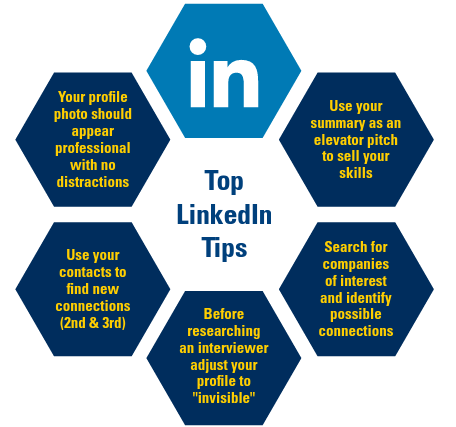
LinkedIn Profile Checklist
LinkedIn is a professional network that allows you to showcase your skills, experiences, and accomplishments in a format that expands on your resume. Use the checklist below to set up your profile for success. You can join the Michigan Engineering Alumni – OFFICIAL GROUP and University of Michigan Alumni groups on LinkedIn to connect with other Michigan Engineers. To view a sample student LinkedIn Profile visit linkedin.com/in/mitch-igan.
PHOTO:
Professional photographer not required. Take a clear and focused picture in front of a plain background wearing a nice shirt or blouse. Be sure to smile. No selfies!

HEADLINE/ABOUT:
Announce “what you are” and “what you hope to be.” Add credibility by highlighting key achievements such as leadership or technical skills.

SUMMARY/ABOUT:
A strong summary will include your strengths, skills, and interests as they relate to your chosen industry.

EXPERIENCE:
List your past and current jobs, even if they were part-time, along with what you accomplished at each. You can also include images and videos of your work.
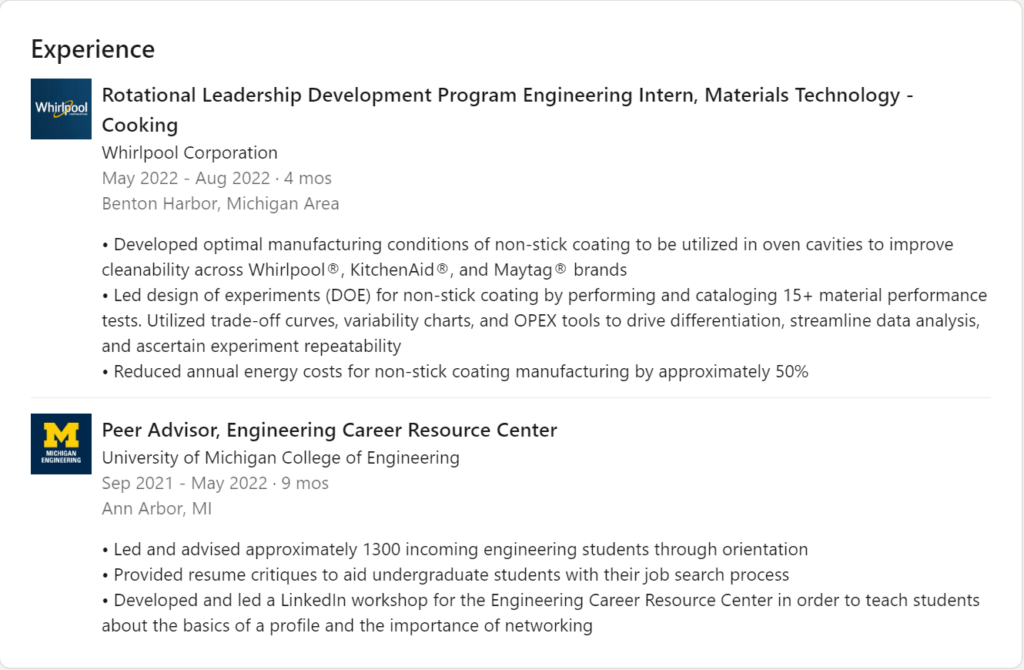
EDUCATION:
Starting with college, list your educational experiences, including study abroad and summer programs. Remove your high school education after one year of college.

RECOMMENDATION
Ask managers, professors, or classmates who have worked with you closely to write a recommendation. This gives extra credibility to your strengths and skills.
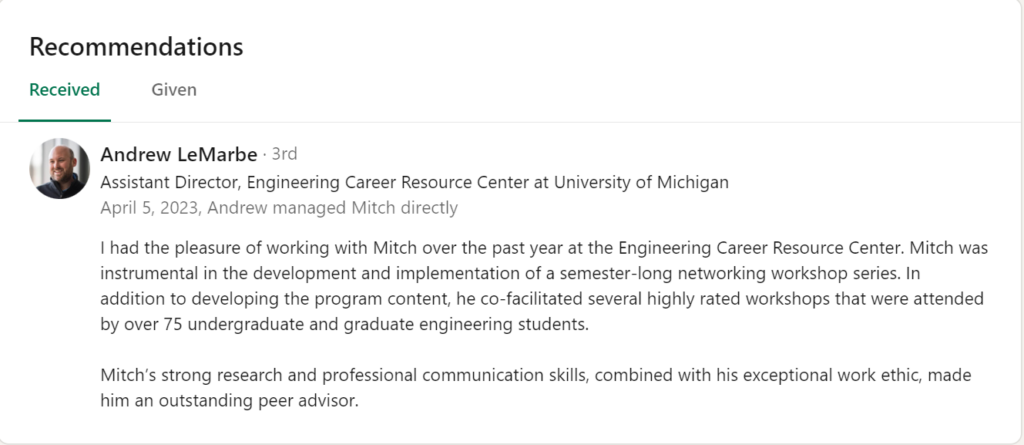
ACCOMPLISHMENTS:
Courses, projects, honors and awards, and organizations can be added to your profile. Think of these sections as your online resume.
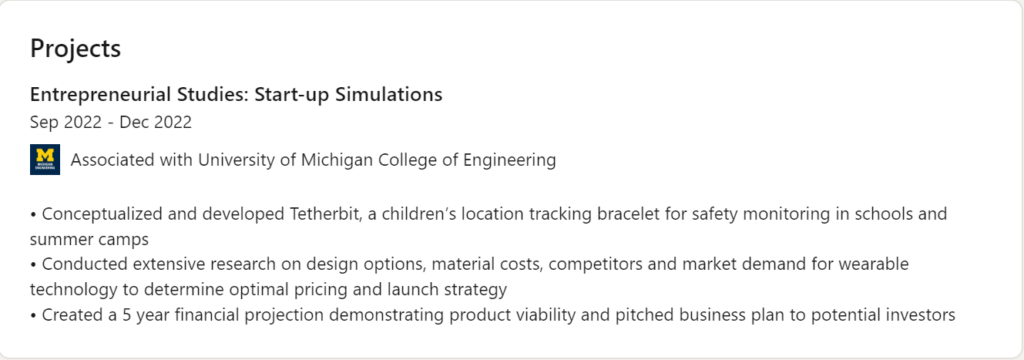

SKILLS & ENDORSEMENTS:
Add your key skills so that your connections can endorse you for the things you do well. Be selective in what you display – only display skills that enhance your brand.

THIRD PARTY RECRUITERS
Employers may hire third-party organizations to assist them in identifying and hiring candidates. The National Association of Colleges and Employers provides A Student’s Guide to Interviewing with Third-Party Recruiters.
IDENTIFYING FRAUDULENT EMPLOYERS/JOB POSTINGS
When applying to a position through any method, the ECRC encourages all job seekers to evaluate the full job description and research the company prior to submitting an application. While the majority of job postings are for legitimate employment opportunities, there have been reports of fraudulent employers/job postings intended to scam job seekers. The ECRC advises job seekers to never disclose bank, financial or any other type of potentially sensitive personal information. If money, payment, or transactions of any type are requested as part of the application process or job itself, please notify the ECRC immediately. If you believe you have been the victim of a job scam or suspect a job or company is not legitimate, please contact the ECRC immediately at [email protected] or (734) 647-7160.
STUDENT RESPONSIBILITIES & POLICIES
Your behavior throughout your job search reflects upon you as a candidate as well as the University of Michigan, so it is important to conduct the search professionally and with integrity. The Code of Ethics states the policy for use of Engineering Careers, by 12twenty, our online recruiting system. The Code of Ethics also defines expectations for participation in interviews, attendance at ECRC events and appointments, as well as acceptance of employment offers. The expectations within the Code of Ethics apply to all members of the Michigan Engineering community.


